Hack This Planet
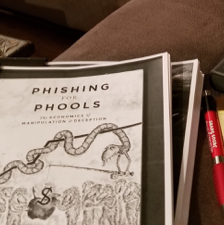 I recently taught a new course – “Deep Policy: Wrong and How to Right It” – at Union Theological Seminary. This was a “pilot” or “workshop” (12 hours over only two days) for what I hope becomes another of my ongoing pursuits, part of the “Institute” behind the Greater Good Initiative I previously wrote you about here and here.
I recently taught a new course – “Deep Policy: Wrong and How to Right It” – at Union Theological Seminary. This was a “pilot” or “workshop” (12 hours over only two days) for what I hope becomes another of my ongoing pursuits, part of the “Institute” behind the Greater Good Initiative I previously wrote you about here and here.
The origins lay in my dissatisfaction with most policy discussions today. We know a good deal about what works and what doesn’t in education, health care, criminal justice, and most major (domestic) issues: We aren’t failing to create better schools, or health coverage, or penal systems because we don’t know how, technically – we’re simply frozen ideologically. I’ve grown less enamored of studying, say, how to secure Social Security’s long-term solvency – it’s really not that hard! – and more interested in why we struggle over venality and insensitivity, generation after generation, millennium after millennium.
I spent the last several months reading extensively in fields relevant to this inquiry: game theory, evolutionary biology, behavioral economics, the study and practice of warfare. I was intrigued several years ago by a comment from a student of mine at Brown about “why societies go crazy” – Nazi Germany, for instance – which initially suggested psychological studies like the famous work of Stanley Milgram, but it also reminded me of the literature on complex-systems failures and disasters, which in turn are reminiscent of complexity and chaos in nature. Trying to distill and teach all this led to some thoughts I’d like to share … and hear your reactions:
-
-
Even the most counterproductive-seeming behavior is purposive.
-
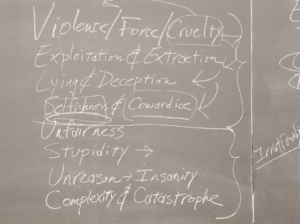
I started with the notion of a spectrum of antisocial behaviors – ranging from the truly malign like killing or non-instrumental violence (“cruelty”), through less culpable behaviors ending in just-plain-stupidity. Turns out, it really breaks down into rational and irrational behaviors – and most bad behavior is actually rational. We all know that lying and deception are rampant in the natural world because they serve real purposes. It may be harder to see a value in, say, “cowardice,” but there actually is: In any lion pride, a certain percentage of lions charge into battle to risk their lives for the others, but there’s also a stable number of slackers – a pride needs both heroes with the courage to sacrifice for the greater good and self-serving cowards who survive, no matter what. The same basically holds true with cruelty: Even when it seems to serve no instrumental purpose, it almost always does (e.g., conveying intention and resolve).
-
-
Crazy ain’t so crazy.
-
As Peter Hayes discusses in his recent book, Why? Explaining the Holocaust, Hitler never achieved majority support, but was elevated to office through the cowardice and self-serving (if ultimately incorrect) calculations of other politicians as to their ability to control him. Once in power, the Nazis exploited terror and, again, rational if not-exactly-admirable cowardice to gain unwilling compliance. Taken together, it’s more a systems failure than mass insanity or depravity. There are other examples of “societies gone crazy” – such as China’s Taiping Heavenly Kingdom, a mass convulsion of fanaticism that killed more people than any other event in human history – but it turns out that there are instrumental reasons for fanaticism. And according to Thucydides, the entire population of Athens “went crazy” and abandoned all ethical norms in the plague that struck during the Peloponnesian War – because everyone knew they wouldn’t live long enough to be punished and so acted accordingly. Alas, all this is rational, if depressing. In fact, as we’ll see, nature essentially requires chaotic processes and outcomes.
-
-
Evil ye shall have with ye always.
-
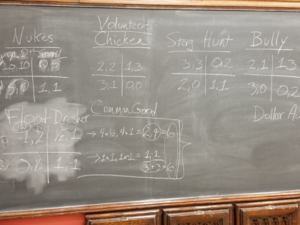
I started this exploration hoping to find a path to eliminating bad outcomes, or at least reducing them. But both game theory and natural science suggest that – as the lions illustrate – a certain amount of “wrong” is required, almost as a physical rule. It is virtually impossible to construct any sort of stable system in which the actors – people, animals, or protons – behave in a consistently self-sacrificing manner. Of course, you can’t construct a stable system, either, in which exclusive self-interest totally prevails, either. A mix is required, and the socially-best mix will involve some pro-social (“hero lions”) and, ironically, some anti-social behaviors (“slacker lions”), with most of us falling somewhere in between. This did not really surprise the seminary students; I found it dispiriting, however, to conclude that wrong is, essentially, an immutable mathematical certainty. The best we can do is not so much eliminate “wrong” as to stave it off for another day, one day at a time. However:
-
-
You can’t put it off forever.
-
Perhaps, like Scheherazade in the Thousand and One Nights, we can so successfully forestall disaster one day at a time that this eventually becomes a permanent state. Unfortunately, that’s not likely. Chaotic systems in nature turn out to follow rules called “power laws” that predict the frequency and magnitude of disturbances: We know with a fair degree of certainty how often certain-sized earthquakes will occur – we just don’t know precisely when. Human events seem to follow similar power laws; as historian Niall Fergusson points out in his recent book, The Great Degeneration, these suggest we’re due for a 10.0 global political earthquake in about, oh, 2020. (That might be a good reason to re-read my piece from the eve of Trump’s election on the history of the 21st)
-
-
There are reasons for altruism.
-
Despite all these bleak observations on human behavior and social breakdown, people and animals living in situations in which it makes mutual sense to cooperate find ways to do so. This is usually enforced through social norms where those who fail to comply are sanctioned. Of course, people often try to get away with bad behavior when they think they can (as in plague-stricken Athens) – but many still engage in “moral” behavior even when they don’t have to, whether that’s because nature (or nurture) has programmed that into us, or because of a rational calculation that the short-term gain of norm-breaking isn’t as valuable as the long-term benefits of being part of a norm-abiding society. You can see that all the time in highway merges where some drivers “cut” the line but most still don’t – except that we know societies also reach “tipping points” where, if too many people “cut,” then everyone does so … leading to mass gridlock.
-
-
Maybe politics really is the answer.
-
I’ve spent my life in and around government, hoping to make both policy and political processes work better. But perhaps that isn’t the best way to make a difference – which is why I’ve focused more recently on things like the Greater Good Initiative, exploring deeper roots of social dysfunction, and social enterprises that might produce better societal outcomes. If, however, we can’t really rid the world of “wrong,” but only constrain and postpone dysfunction, perhaps a day at a time, it’s political and governance mechanisms that provide the means for doing so: Devising more “resilient systems” that can survive perturbations without spinning into chaos. Creating the communications and coordination that allow people to “escape” the Prisoner’s Dilemma and other game theory challenges. Or simply finding the compromises that let us stave off bad outcomes for one more day. So, maybe I’ve been in the right place all along….
-
-
A world without either communism or capitalism?
-
One thing I was not prepared for was how extremely liberal these seminary students turned out to be: I rarely find myself to be the most right-wing person in the room. Their righteous indignation at the economic and political mores of our times, however, forced me to revisit and rethink a lot of the “realities” I’ve come to accept. On the other hand, their vehement denunciations of capitalism reminded me of college debates back in my day with the Marxist and Third World sets – except that Marxism, socialism and the like never came up in this discussion. It was striking the extent to which truly leftist solutions have completely vaporized – even amongst these left-y and Third World students. The students’ proposed solutions seemed essentially to be to bring back relatively mild economic redistribution programs from the Sixties. But both the nation-state and global capitalism face serious challenges from new technologies; these technologies – changing the very nature of work, ownership and capital – will require an entirely new conception of economics.
-
-
Hackathon, anyone?
-
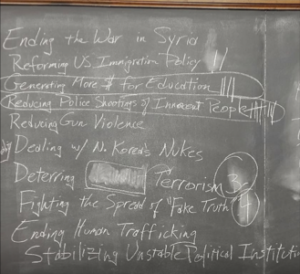 That brings me to my final, and most felicitous, discovery in teaching this course – that creative new ideas can be easily forthcoming if we just bring together committed people to discover them. In the most recent update I sent you, I discussed the plan for developing the Greater Good Initiative into, in part, a series of localized efforts to solve policy problems outside of the usual policy channels. The question is how best to do that; my concluding course segment might provide a good potential model – one I borrowed from the burgeoning “hackathon” phenomenon. We closed the course with two one-hour (all-too-brief) “policy hackathon” sessions, where the students chose from a list of intractable issues, split into small groups, spent 30 minutes brainstorming original ideas, then presented them to the class. While the students were bright and well-informed, they had no particular policy background or expertise – but in every case, and in short order, the groups produced innovative ideas unlike those coming out of think tanks and political parties today. Similar policy and social venture “hackathons” around the country are just the interactive process the Greater Good Initiative needs.
That brings me to my final, and most felicitous, discovery in teaching this course – that creative new ideas can be easily forthcoming if we just bring together committed people to discover them. In the most recent update I sent you, I discussed the plan for developing the Greater Good Initiative into, in part, a series of localized efforts to solve policy problems outside of the usual policy channels. The question is how best to do that; my concluding course segment might provide a good potential model – one I borrowed from the burgeoning “hackathon” phenomenon. We closed the course with two one-hour (all-too-brief) “policy hackathon” sessions, where the students chose from a list of intractable issues, split into small groups, spent 30 minutes brainstorming original ideas, then presented them to the class. While the students were bright and well-informed, they had no particular policy background or expertise – but in every case, and in short order, the groups produced innovative ideas unlike those coming out of think tanks and political parties today. Similar policy and social venture “hackathons” around the country are just the interactive process the Greater Good Initiative needs.
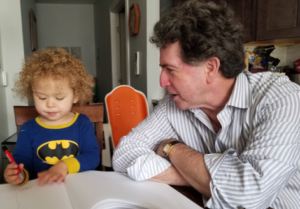 Well, at least one student took notes on my lectures….
Well, at least one student took notes on my lectures….
What do you think? I’d love to hear your feedback in the comments below.







Leave A Comment